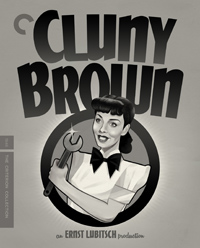 Criterion resurrects Ernst Lubitsch’s final completed film Cluny Brown (1946), a post-war comedy about pre-WWII class divisions in 1938 England. Headlined by Jennifer Jones, fresh off her divorce from actor Robert Walker and whose career was now completely in the hands of lover and eventual second husband, studio titan David O. Selznick, it’s an odd standout in her filmography of serious, dramatic turns. Having already acquired a Best Actress Academy Award (The Song of Bernadette, 1943), Jones is the titular protagonist, playing the prototype of a character whose overarching traits would eventually come to be known as the Manic Pixie Dream Girl. An orphan from a humble background, Cluny, who has a passion for plumbing she inherited from her uncle and caretaker, is sent to work as a parlor maid in the reserved country manor of rich folk because she has yet to ‘learn her place’ in the world. The incident instigating her exile was due to her stepping in for her uncle on a Sunday emergency call, wherein she fixes the pipes before being plied with liquor by a coincidental guest at the residence, the dapper Adam Belinski, a charming Czech immigrant played by Charles Boyer, here a famed author who’s on the run from the Nazis.
Criterion resurrects Ernst Lubitsch’s final completed film Cluny Brown (1946), a post-war comedy about pre-WWII class divisions in 1938 England. Headlined by Jennifer Jones, fresh off her divorce from actor Robert Walker and whose career was now completely in the hands of lover and eventual second husband, studio titan David O. Selznick, it’s an odd standout in her filmography of serious, dramatic turns. Having already acquired a Best Actress Academy Award (The Song of Bernadette, 1943), Jones is the titular protagonist, playing the prototype of a character whose overarching traits would eventually come to be known as the Manic Pixie Dream Girl. An orphan from a humble background, Cluny, who has a passion for plumbing she inherited from her uncle and caretaker, is sent to work as a parlor maid in the reserved country manor of rich folk because she has yet to ‘learn her place’ in the world. The incident instigating her exile was due to her stepping in for her uncle on a Sunday emergency call, wherein she fixes the pipes before being plied with liquor by a coincidental guest at the residence, the dapper Adam Belinski, a charming Czech immigrant played by Charles Boyer, here a famed author who’s on the run from the Nazis.
Jones excels here, though to be fair, she provides as much solace and succor to Boyer as he does her when he unexpectedly shows up as the guest at the same country manor, a man we come to understand depends on the kindness of liberal minded strangers. Boyer is at his effervescent best as the charming Belinski and strikes an oddly likeable energy with Jones, donning an affect which initially seems a bit cloying (however, for those familiar with the accent choices made in Powell & Pressburger’s The Wild Heart, which Selznick re-cut and re-released in 1952 as Gone to Earth, Jones’ Cluny Brown is comparably pleasing). Less likely is Cluny’s supposed romance with the ultra-fussy shopkeeper played with laudable seriousness by Richard Haydn (with Una O’Connor as his congested and disdainful invalid mother), which of course becomes the dramatic catalyst for the union of the two leads. Effervescent, as Lubitsch was oft wont to be, it may not reach the generously comical heights of his greatest (Ninotchka, 1939; To Be or Not To Be, 1942), but it’s a fitting finale in its devious examination of smug, supercilious social hierarchies and of running off into the destiny derived from one’s own passionate inclinations.
Notably, Lubitsch’s obscured final film provides the basis for the romantic punchline in Peter Bogdanovich’s 2014 film She’s Funny That Way, initially titled Squirrel to the Nuts, the mantra established by Jones and Boyer.
Film Review: ★★★½/☆☆☆☆☆
Disc Review: ★★★★/☆☆☆☆☆


